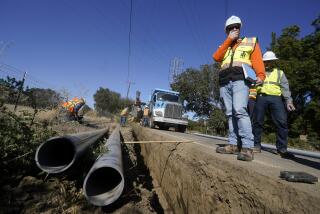No Changes in Short Term for Consumers
- Share via
The merger of Enova Corp., parent company of San Diego Gas & Electric Co., and Pacific Enterprises, parent of Southern California Gas Co., would create the nation’s largest utility in number of customers.
*
Q: Where would the newly merged company be based? What would it be called?
*
A: The new company’s corporate headquarters would be in San Diego. The name has not been decided.
Southern California Gas Co. would keep its name and remain based in Los Angeles. San Diego Gas & Electric would similarly keep its name and San Diego headquarters.
The unregulated subsidiaries of the new company would be based in Los Angeles.
*
Q: How would the merger affect residential and business customers for natural gas and electricity?
*
A: In the short term, executives of both Enova and Pacific Enterprises say customers should see no change in their service. The firms have little overlap of their natural gas service territories. They share about 70,000 customers in south Orange County.
In theory, there should eventually be lower rates. The executives expect cost savings from the merger of about $1.2 billion over 10 years. Under state law, at least half that savings must be passed on to customers in the form of lower rates.
Moreover, the merger would create a formidable competitor to Southern California Edison Co., San Francisco-based Pacific Gas & Electric Co. and energy companies outside the state who will find themselves scrambling for customers in a deregulated industry that goes into effect in January 1998.
Advocates of deregulation say that will mean lower electric rates, particularly for large commercial and industrial customers who will also have the option of negotiating direct power contracts with generators. However, consumer advocates worry about the anti-competitive effects on consumers of combining the two companies.
With or without this merger, residential customers of the investor-owned utilities, meanwhile, are supposed to see a 10% cut in their rates in 1998 under California’s new electric deregulation law.
*
Q: What would the merger mean for employees of the two companies?
*
A: The merged firm would have about 11,760 employees. Executives expect to cut about 9% of those jobs, or about 1,060, through attrition, buyouts and “negotiated reductions.” They emphasize that the reductions won’t affect the two utilities’ field work forces.
Executives add that new business opportunities could create jobs to offset the positions eliminated.
*
Q: What would the merger mean for shareholders of both companies?
*
A: Pacific Enterprises shareholders would receive 1.5038 shares of the new company’s common stock in exchange for each share of Pacific Enterprises. Enova shareholders would get one share for each of their shares. The exchange is expected to be tax-free. The new dividend would be paid at the rate of $1.56 a share, currently the rate for Enova shareholders. For Pacific Enterprises shareholders, this would be equivalent to $2.35 on their existing shares. Following the merger, Enova shareholders would hold about 48% of the new company and Pacific Enterprises holders would end up with about 52%.
More to Read
Inside the business of entertainment
The Wide Shot brings you news, analysis and insights on everything from streaming wars to production — and what it all means for the future.
You may occasionally receive promotional content from the Los Angeles Times.










